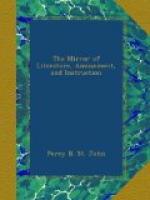standard is supposed to have been deposited, with
other measures, &c. in Winchester; he likewise (it
is said) ordered halfpence and farthings to be made
round, which before his time were square.—The
Universities of Oxford and Cambridge were first called
“studia,” or “studies.”—Edward
the Confessor received yearly, from the manor of Barton,
near Gloucester, 3,000 loaves of bread for the maintenance
of his dogs—In the reign of Edward III.,
only three taverns might sell sweet wines in London;
one in Cheape, one in Wallbrook, and the other in
Lombard Street.—Lord Lyttleton, in his Life
of Henry II., vol. i. p. 50, says, “Most of our
ancient historians give him the character of a very
religious prince, but his religion was, after the
fashion of those times, belief without examination,
and devotion without piety. It was a religion
that at the same time allowed him to pillage kingdoms,
that threw him on his knees before a relic or a cross,
but suffered him unrestrained to trample upon the liberties
and rights of mankind;” again, “his government
was harsh and despotic, violating even the principles
of that institution which he himself had established.
Yet so far he performed the duty of a sovereign that
he took care to maintain a good police in his realm;
which, in the tumultuous state of his government,
was a great and difficult work.” How well
he performed it, we may learn even from the testimony
of a contemporary Saxon historian, who says, “during
his reign a man might have travelled in perfect security
all over the kingdom, with his bosom full of gold;
nor durst any kill another in revenge of the greatest
offences, nor offer violence to the chastity of a woman.
But it was a poor compensation that the highways were
safe, when the courts of justice were dens of thieves,
and when almost every man in authority, or in office,
used his power to oppress and pillage the people.”—Towards
the close of the life of Henry IV., he kept the regal
diadem always in his sight by day, and at night it
shared his pillow. Once the Prince of Wales,
whom Henry always suspected more than he loved, seeing
his father in a most violent paroxysm of disease,
removed the crown from his bed. The king on his
recovery missed it, sent for his son, and taxed him
with his impatience and want of duty, but the prince
defended his conduct with such rational modesty, that
Henry, convinced of his innocence, embraced and blessed
him. “Alas!” said Henry to his son,
“you know too well how I gained this crown.
How will you defend this ill-gotten possession?”
“With my sword,” said the prince, “as
my father has done.”
Henry V. was, perhaps, the first English monarch who had ships of his own. Two of these, which sailed against Harfleur, were called “The King’s Chamber,” and “The King’s Hall.” They had purple sails, and were large and beautiful.




